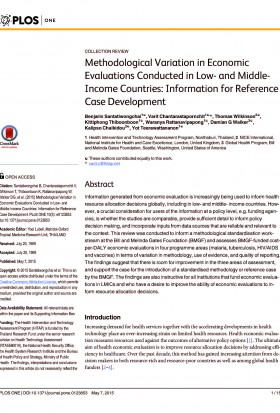This website uses cookies so that we can provide you with the best user experience possible. Cookie information is stored in your browser and performs functions such as recognising you when you return to our website and helping our team to understand which sections of the website you find most interesting and useful.
Methodological Variation in Economic Evaluations Conducted in Low- and Middle- Income Countries: Information for Reference Case Development

Details
Benjarin Santatiwongchai1☯, Varit Chantarastapornchit1☯*, Thomas Wilkinson2☯,Kittiphong Thiboonboon1☯, Waranya Rattanavipapong1☯, Damian G Walker3☯,Kalipso Chalkidou2☯, Yot Teerawattananon1☯
1 Health Intervention and Technology Assessment Program, Nonthaburi, Thailand, 2 NICE International,National Institute for Health and Care Excellence, London, United Kingdom, 3 Global Health Program, Bill and Melinda Gates Foundation, Seattle, Washington, United States of America
Abstract
Information generated from economic evaluation is increasingly being used to inform health resource allocation decisions globally, including in low- and middle- income countries. However,a crucial consideration for users of the information at a policy level, e.g. funding agencies,is whether the studies are comparable, provide sufficient detail to inform policy decision making, and incorporate inputs from data sources that are reliable and relevant to the context. This review was conducted to inform a methodological standardisation workstream at the Bill and Melinda Gates Foundation (BMGF) and assesses BMGF-funded costper- DALY economic evaluations in four programme areas (malaria, tuberculosis, HIV/AIDS and vaccines) in terms of variation in methodology, use of evidence, and quality of reporting. The findings suggest that there is room for improvement in the three areas of assessment, and support the case for the introduction of a standardised methodology or reference case by the BMGF. The findings are also instructive for all institutions that fund economic evaluations in LMICs and who have a desire to improve the ability of economic evaluations to inform resource allocation decisions.
Introduction
Increasing demand for health services together with the accelerating developments in health technology place an ever-increasing strain on limited health resources. Health economic evaluation measures resources used against the outcomes of alternative policy options [1]. The ultimate aim of health economic evaluation is to improve resource allocation decisions by addressing efficiency in healthcare. Over the past decade, this method has gained increasing attention from decision makers in both resource-rich and resource-poor countries as well as among global health funders [2–4].
Established in 2000, an aim of the Bill & Melinda Gates Foundation (BMGF) is to enhance healthcare through supporting technology development in areas beset by particular health problems, including neglected tropical diseases and vaccine preventable diseases. Since 2004, BMGF has provided cumulative funding in excess of US$200 million for cost-effectiveness analysis and related activities around the world.
To maximise the benefit of economic evaluation information to health policy decisions, it is essential that the studies are comparable both within and across health problems as well as properly performed and reported to effectively assist the health investment decisions that could subsequently have a large impact on the health of target populations. Limited methodological quality is reported to be a significant barrier to the effective use of economic evaluation information [5–7]. This is of particular concern in low- and middle- income countries (LMICs) where research capacity in this field and reliable data sources are insufficient [7,8], and there are few methodological guidelines for performing locally-relevant economic evaluation [9]. As a result, BMGF, being a major funder of this type of research, aims to pioneer the development of a reference case for conducting health economic evaluations in developing countries to be referred to not only by its grantees but also by researchers who receive financial support from other funders.
Prior to this review, there was substantial uncertainty regarding the number, quality, methodology and focus of BMGF-funded economic evaluations as there was no repository or centralised collation mechanism. A key element of the reference case development and the aim of this review was to present a snapshot of the current status of BMGF-funded economic evaluations in focus programme areas.
Full text can be accessed from:
http://journals.plos.org/plosone/article?id=10.1371/journal.pone.0123853




